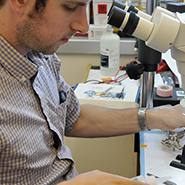Researchers have made great progress in understanding early human social cognition. Nevertheless, two questions remain unanswered: Do infants organize observed social relations into larger structures, inferring the relationship between two social beings based on their relations to a third party? Second, do infants reason about a network of social relations prominent in all societies: relations of kinship?
We approach these questions in a series of experiments using animated displays and abstract social characters by asking whether 15- to 18-month-old infants expect two babies who were comforted by the same caregiver to affiliate with one another.
We have also begun exploring the emergence of the ability to reason about affiliative behaviors with infants at 9 months and 11 months.

 Understanding the development of intelligence in a human infant is a key project of CBMM. This project engages the fundamental tradeoff between nature and nurture, or priors and data, and ultimately the origin of priors—how constraints are selected by evolution, encoded in genes, and instantiated in genetically wired brain circuits.
Understanding the development of intelligence in a human infant is a key project of CBMM. This project engages the fundamental tradeoff between nature and nurture, or priors and data, and ultimately the origin of priors—how constraints are selected by evolution, encoded in genes, and instantiated in genetically wired brain circuits.